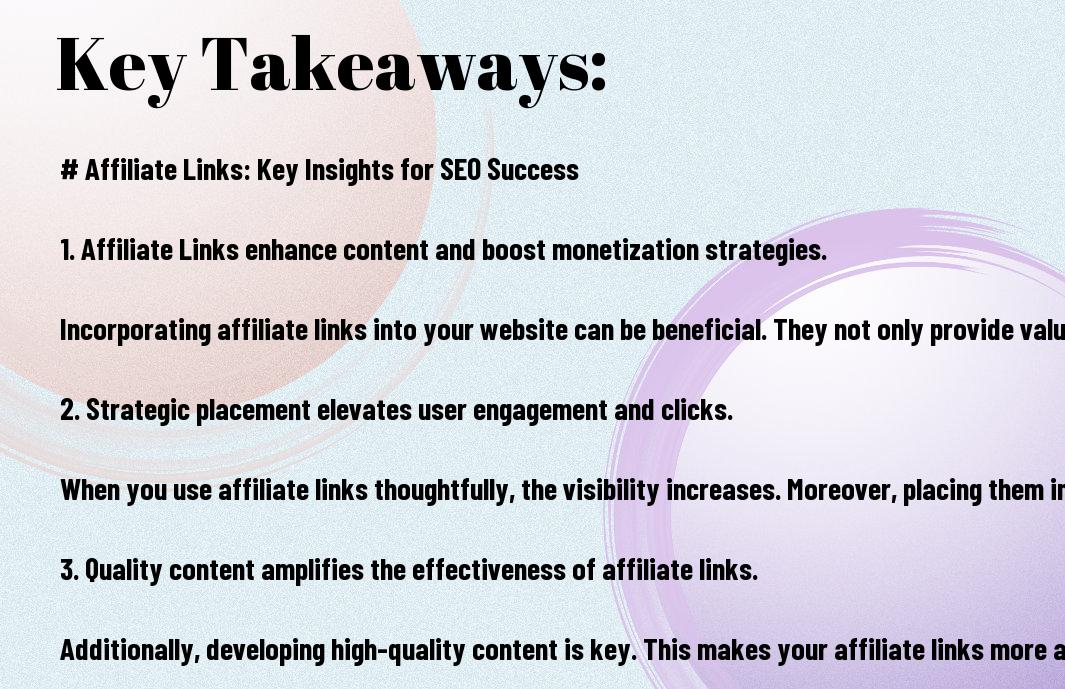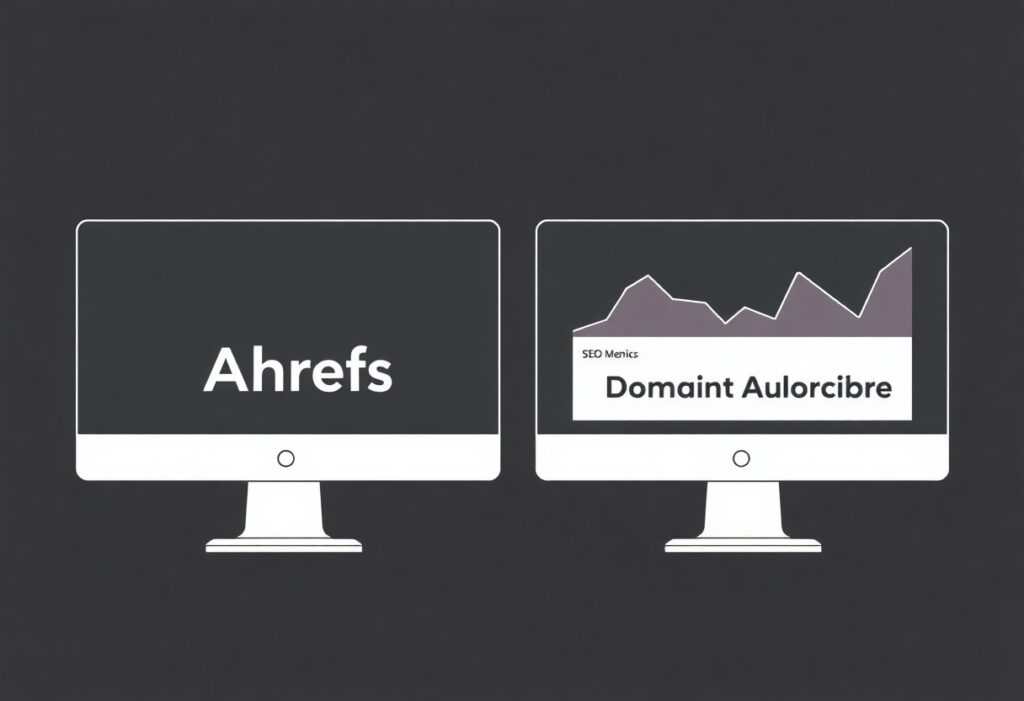Over the years, affiliate links have emerged as a powerful tool for enhancing your SEO strategy. By incorporating these links, you can boost your website’s visibility and drive more traffic. However, it’s crucial to understand how to use them effectively. Primarily, they can enhance your content and create valuable partnerships. On the flip side, using them improperly could lead to penalties from search engines. Therefore, focus on quality content and ensure your affiliate links are relevant to your audience. At Rank Authority, we harness AI technologies to help you navigate these complexities and achieve lasting success in the digital landscape.

Understanding Affiliate Links
For anyone looking to boost their revenue through online platforms, affiliate links play a pivotal role. These are special URLs that enable you to earn a commission for each sale or action generated through your unique link. By integrating affiliate links into your content, you can monetize your platform effectively, providing value to both your audience and affiliate partners.
Definition and Purpose
Among the various digital marketing strategies, affiliate links stand out as an effective method for individuals and businesses to earn money online. Simply put, an affiliate link is a tracking URL that directs users to the product or service offered by a vendor. When a consumer makes a purchase through this link, you earn a commission, creating a win-win situation for all parties involved.
Types of Affiliate Links
To optimize your strategy, it is important to understand the different types of affiliate links available. Essentially, these categories can help you decide which links to incorporate based on your audience’s preferences and engagement levels.
| Type | Description |
| Text Links | Embedded within relevant content. |
| Banner Ads | Visual links showcased on your site. |
| Email Links | Inserted in newsletters or campaigns. |
| Social Media Links | Promoted on platforms like Facebook or Instagram. |
| Product Widgets | Dynamic, interactive listings of products. |
Understanding the different types of affiliate links will enhance your ability to monetize your content. Text links are subtle, while banner ads are eye-catching. Alternatively, email links and social media options can broaden your reach. In contrast, product widgets offer a comprehensive view of multiple items. Tailor the type of affiliate links you use based on your audience demographics and behavior, improving the chances of conversion. Thou, selecting the right type of affiliate link matters significantly to your affiliate marketing success.
SEO Benefits of Using Affiliate Links
One of the primary advantages of using affiliate links is their potential to enhance your SEO efforts. When you incorporate affiliate links, your content becomes more valuable and resourceful, as well as offering readers relevant product or service recommendations. Not only do affiliate links align with your content, but they also provide opportunities for backlinks, which can significantly improve your site’s authority and ranking in search engines. By strategically using affiliate links, you are taking steps toward increased visibility on the web, benefiting both your audience and your search engine optimization goals.
Enhanced Content Value
An effective way to boost your content value is by integrating affiliate links seamlessly into your articles. These links serve as helpful resources for your audience, leading to a more informative reading experience. Furthermore, by providing well-researched recommendations, you build trust with your readers, which can result in higher conversion rates. Ultimately, when you enrich your content with affiliate links, you’re not just promoting products; you’re also enhancing your readers’ understanding of the subject matter.
Increased Traffic and Engagement
Between the strategic use of affiliate links and your audience’s interests, you’re likely to see increased traffic and engagement. By incorporating well-placed affiliate links, you can direct interested readers to relevant products and services, thereby enticing them to explore further. This not only encourages them to stay on your site longer but also enhances their overall experience.
Using affiliate links effectively can lead to significant benefits in terms of both traffic and engagement. By connecting your content to high-quality products and services, you not only satisfy your audience’s needs but also enhance your site’s authority. This, in turn, encourages readers to return, driving more traffic. Additionally, shared content with affiliate links often garners attention on social platforms, extending your reach even further. Ensure that your affiliate links align with your content and provide value to your readers, and you’ll foster a more engaged audience eager to interact with your site.

Best Practices for Implementing Affiliate Links
All successful affiliate marketers understand the importance of implementing affiliate links wisely. To maximize your earnings and maintain a positive user experience, consider several best practices. Focus on relevant content that seamlessly integrates affiliate links, ensuring they align with your audience’s interests. Additionally, keep your links organized and regularly audit them for performance. By employing these strategies, you can enhance your credibility and increase conversions, ultimately benefiting both your audience and your efforts as a marketer with Rank Authority.
Placement and Visibility
After selecting your affiliate links, you need to think carefully about their placement and visibility. Place them in natural spots within your content, such as within blog posts, product reviews, or tutorial sections. Ensure they are noticeable but not intrusive, which can deter your audience from engaging. Using descriptive anchor text can also enhance the appeal and relevance, guiding your readers to click through effectively.
Compliance with SEO Guidelines
Affiliate links must comply with SEO guidelines to ensure your site’s credibility remains intact. This involves disclosing your affiliate relationships and using nofollow attributes where appropriate. This practice informs users about your associations and prevents potential penalties from search engines.
Indeed, non-compliance can lead to severe consequences, negatively impacting your site’s ranking and trustworthiness. For affiliate links, use the rel=”nofollow” attribute to indicate which links are sponsored. This step is necessary in maintaining transparency with your audience. Additionally, make sure you’re disclosing your affiliate status in a visible manner in line with FTC guidelines. By adhering to these regulations, you preserve the integrity of your site and build a trustworthy relationship with your audience, ultimately benefiting your SEO efforts with Rank Authority.

Measuring the Success of Affiliate Links
Your ability to measure the success of affiliate links is vital for optimizing your SEO strategy. By analyzing key metrics and employing effective tools, you can understand how well your affiliate links are performing and enhance your overall marketing efforts. The insights gained will inform your decisions, helping you generate more traffic and conversions. Ultimately, through careful measurement, you position yourself and your website to achieve optimal results in affiliate marketing.
Key Metrics to Track
About tracking important metrics is fundamental to assessing the effectiveness of your affiliate links. Some pivotal metrics to monitor include click-through rates (CTR), conversion rates, and average order value (AOV). Additionally, consider tracking your return on investment (ROI) to evaluate the performance of your affiliate partnerships. Attention to these metrics will provide you with actionable insights, guiding your decisions toward maximizing links’ potential.
Tools for Analysis
Any solid analysis of your affiliate links requires leveraging the right tools. Analytics platforms, such as Google Analytics and affiliate marketing software, can provide detailed reports on your traffic and conversion patterns. These tools help you uncover valuable data that can influence your strategies. Also, consider integrating tracking links with unique identifiers to better attribute conversions to specific affiliate sources.
Another option is to use more specialized tools like affiliate dashboards that provide in-depth reporting features. Many of these tools allow you to track the performance of each link separately, giving you insights into how each affiliate is performing. Strong metrics, such as revenue generated per click, empower you to audit your affiliate relationships effectively. Additionally, automating reports not only saves time but also ensures accuracy in your evaluations. Overall, the right tools will enhance your ability to optimize affiliate links and drive your SEO success with Rank Authority.
Common Mistakes to Avoid
Unlike many assume, successful implementation of affiliate links isn’t just about the number you use. A common pitfall is overloading your content with these links, which can negatively affect your SEO efforts. Instead of enhancing your site’s trustworthiness, excessive affiliate links may lead to penalties from search engines or reduced user engagement. To ensure your strategy works effectively, focus on providing value to your audience while integrating affiliate links naturally. This balanced approach can yield better results, leading to increased clicks and conversions.
Overusing Affiliate Links
On many occasions, you might find yourself tempted to insert numerous affiliate links into a single post. However, this strategy can backfire. By cluttering your content with too many links, you can alienate your audience, causing them to disengage. Therefore, it’s best to maintain a moderate number of well-placed affiliate links that enhance your content, rather than overwhelm it.
Ignoring Analytics
Around your affiliate marketing journey, it’s easy to overlook the critical role of analytics. However, by not utilizing analytics, you miss out on valuable insights that can improve your strategy. Understanding which links perform well versus those that don’t is vital for optimizing your efforts and maximizing revenue.
At this point, you should prioritize analyzing your traffic and the performance of your affiliate links. Tracking metrics such as click-through rates and conversion rates helps you make informed decisions. By identifying which affiliate links are driving engagement, you can focus your energy on effective strategies. Ultimately, this not only boosts your income potential but also enhances your ability to provide valuable resources to your audience. Regularly reviewing your analytics ensures that you stay aligned with your goals and continuously improve your website’s performance.

Future Trends in Affiliate Marketing and SEO
To stay competitive, you must keep an eye on future trends in affiliate links and SEO. As digital landscapes evolve, so too will the strategies that sustain affiliate marketing efforts. In particular, embracing innovations will lead to more personalized user experiences and improved conversion rates. By adapting to emerging trends, you position yourself better for success in this dynamic environment.
Evolving Strategies
Evolving strategies in affiliate marketing involve integrating innovative content techniques and refining SEO approaches. As user preferences shift, you need to adjust your tactics to accommodate more interactive and engaging formats. Incorporating video content, bonuses, or exclusive offers can significantly enhance user engagement, driving more traffic through your affiliate links.
Integration with Emerging Technologies
Affiliate marketing will increasingly rely on cutting-edge technologies. You can leverage tools like AI and machine learning to analyze data, optimize campaigns, and identify high-performing affiliate links. This approach helps you maximize your reach and effectiveness in your marketing efforts.
Also, as technologies like voice search and AR/VR become mainstream, your affiliate strategies must adapt accordingly. With voice search, optimizing your content for natural language queries can enhance visibility. Furthermore, immersive experiences through AR/VR can create unique opportunities for showcasing products via affiliate links. Failing to adapt to these emerging trends could impact your rankings and overall engagement. Stay informed and proactive to ensure your strategies remain effective and relevant.
Conclusion
To wrap up, Affiliate Links are a valuable tool in enhancing your SEO strategy. By integrating well-placed affiliate links within your content, you can create pathways that not only boost your website’s ranking but also generate additional revenue. Furthermore, ensuring these links are relevant to your audience will improve user experience and engagement. Also, tracking the performance of your affiliate links is vital, as it unveils insights to optimize your strategy further. With consistent efforts and the right approach, your use of Affiliate Links can lead to significant growth and visibility for your brand, supported by Rank Authority’s AI-driven solutions.
FAQ
Q: What are Affiliate Links and how can they enhance my website’s SEO?
A: Affiliate links are URLs that contain a unique identifier for tracking referrals and sales. They direct users to products or services. By incorporating affiliate links into your content, you can enhance your website’s SEO. This happens because relevant affiliate links increase user engagement, which can subsequently improve your site’s ranking. Additionally, when used wisely, affiliate links contribute to your overall content strategy, leading to higher organic traffic. For optimal performance, ensure your affiliate links are placed naturally within your content. Here at Rank Authority, we emphasize the strategic placement of these links for maximum effectiveness.
Q: How can I effectively use Affiliate Links without harming my SEO?
A: To use affiliate links effectively, maintain a balance between content quality and promotional links. Start by integrating affiliate links seamlessly within valuable content. This method ensures that users gain insights, thereby increasing their likelihood of clicking through. Furthermore, avoid overstuffing your content with affiliate links. Instead, focus on creating comprehensive guides or reviews. In addition, consider using “nofollow” tags on certain affiliate links to prevent search engines from associating those links directly with your content’s SEO value. At Rank Authority, we recommend regular audits to ensure that all outgoing links, including affiliate links, add value.
Q: Do Affiliate Links affect my site’s load time or user experience?
A: Affiliate links themselves typically do not significantly affect your site’s load time. However, excessive links or poorly coded redirects can hinder performance. To maintain an optimal user experience, ensure that your site is fast and responsive. Use credible affiliate programs that prioritize user experience. Moreover, regularly test your pages for speed and responsiveness. Tools like Google PageSpeed Insights can aid with this. Lastly, as you incorporate affiliate links into your articles, remember that a positive user experience can lead to better SEO outcomes. At Rank Authority, we advocate for a holistic approach, focusing both on links and site performance.













